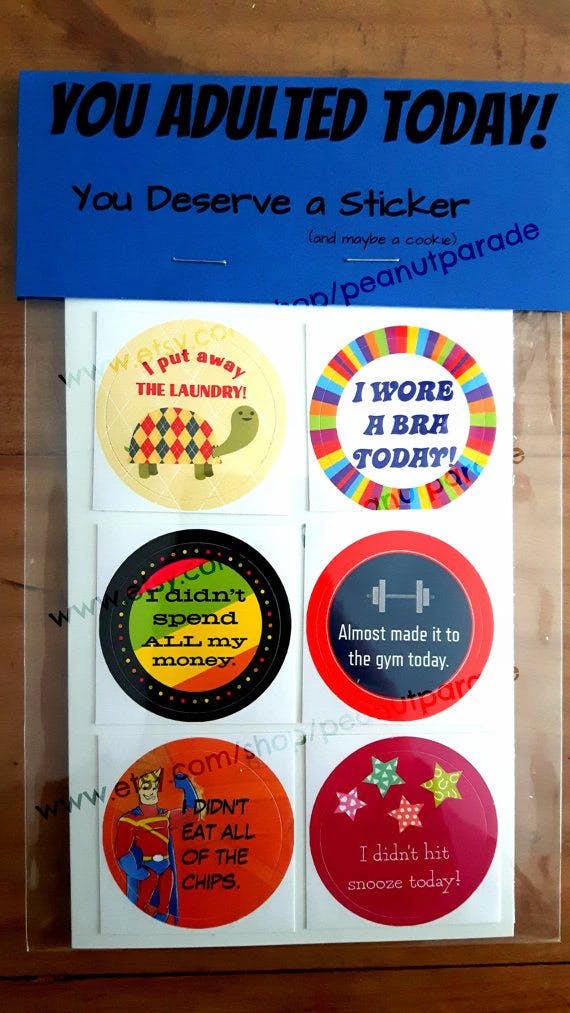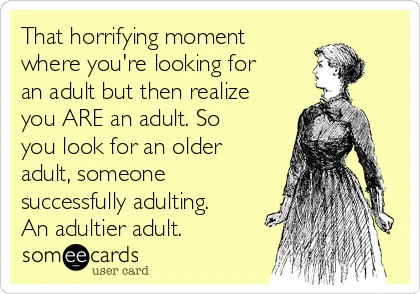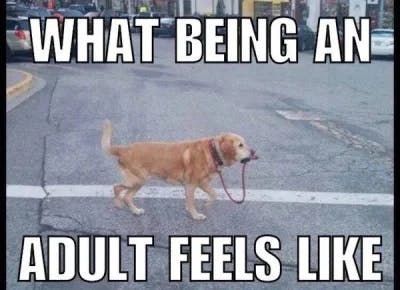Young People Are Obsessed With “Adulting.” But What Does Being Grown Up Really Mean?
We all know that one person — the one who never pays their own bills or picks up their own bar tab. If they do happen to have a 9 to 5, they’re constantly complaining about it, and they definitely don’t have the same grasp of responsibility that other independent young adults do. Young people seem to be preoccupied with and have a weird reverence for “adulting,” but do they even know what it means?

While I’m never quick to judge someone who still lives with their parents, having been there before myself, any person who can’t seem to cut the cord from their bankroller, gets blackout drunk or parties hard every weekend, and generally has an immaturity about them — yet calls themselves an adult — is cause for concern in my book.
There’s been a lot of criticism geared towards this younger generation, both deserved and undeserved. On the one hand, they’re a generation struggling to find their voice and their purpose in a world riddled with some of the worst catastrophes we’ve seen in a long time. On the other hand, they often seem to worship at the altar of self-obsession and entitlement, while wearing their bad management of mental health like a badge of honor.
We were all kids once, and it’s safe to say those of us past a certain age probably consider ourselves adults. But how did we even know we became adults, and why does it feel like the bar is set so low these days? What does it actually mean to be an adult?
What’s “Adulting”?
The American Dialect Society previously chose adulting as a “word of the year.” By dictionary definition standards, it means “to behave in an adult manner; engage in activities associated with adulthood.”

You wouldn’t know adulting had any connotations whatsoever with that definition by today’s standards. Over the years, adulting has more or less evolved into an aesthetic, or a vibe, as the kids say. You can use it in an Instagram caption or a Snapchat story, but the less-than-ideal aspects of adulthood don't seem to be something young people these days are actually aspiring to.
Adulting is a term used when a person fulfills a basic prerequisite of adulthood and wants to feel special.
Adulting nowadays is not remembering to pay your bills on time or having clean laundry when you need it; it’s waking up early to stand in line to get into a new brunch spot, or going to work hungover.
Madeleine Davies writes, “Adulting is a term most often used when a person fulfills a basic prerequisite of adulthood and wants to feel special — or, worse than that, be charmingly self-deprecating — about it.” Basically, when we celebrate #adulting, we’re patting ourselves on the back for doing the bare minimum. In reality, the aesthetic of adulting doesn’t look a whole lot like being an adult.

Is Being Grown Up Really That Hard?
Any adult will tell you being one is not butterflies and rainbows. It’s grueling and exhausting, but by failing to prepare our kids for what they actually might face, we’re creating a desire in young people to stay “young” forever and to have nothing to do with independence. Adulthood is seen as something to be avoided rather than embraced, yet it’s the natural progression of life.

What are some of the most difficult things to accept about being an adult? Monotony, a changing mind and body, accepting responsibility, sacrifice, and doing things day after day that you might hate. It’s no walk in the park sometimes, but there’s something to be said for the independence, growth, and progress we make as adults.
Even though society says we’re entitled to our youth long into adulthood, we’ll ultimately have to face it.
Brianna Weist for Bustle writes, “There is this running joke, this idea that being a functioning adult is ‘hard,’ and while yes, there's humor in truth, it is so prevalent that it almost sheds light on a different issue entirely: we are struggling to function, so much so that we're making it cool not to have your sh*t together. It's not that you have to be a flawless human being at all times, but that looking at basic, regular tasks is not cute or funny. It puts us at a disadvantage. It teaches young people that they're incapable of simple things.”

We can wax poetic for however long we want on the unfairness of paying taxes or not being kids forever and how ill-equipped we are to pay for utilities and get oil changes, but sooner or later, we will have to accept the obvious. We won’t stay kids forever, and though the overarching cultural narrative is that we’re entitled to our youth long into adulthood, we’ll ultimately have to face it. And no amount of “adulting apps” or meal kits for young adults to teach them cooking will change that realization.
Being Responsible Adults Isn’t Cool Anymore
When it comes down to it, adulting is essentially about taking responsibility and accountability for your actions. Does it suck sometimes? Sure, but we all have to do it.
In today’s society, there’s all manner of ways to avoid taking responsibility for something. When you think about it, in fairness, younger generations aren’t super prepared to tackle adulthood, and that’s the fault of older generations for coddling them and not equipping them with everything they need. We paint such a terrible picture of the realities of adulthood that it’s no wonder young adults want nothing to do with it. It’s cool to act like a teenager all the time; it’s not cool to have a mortgage or a monthly car payment. It’s cool to go on vacay several times a year, and not cool to work a job with benefits. It’s cool to live the single life, and not cool to get married and have kids.
All the things that tie us to adulthood mean accepting there are things more important than ourselves.
All of the things that tie us to so-called adulthood — commitment, money, responsibility, etc. — mean accepting that there are things out there more important than ourselves. When we’re young and carefree, there’s nothing more crucial to our lives than our own happiness. But over the years, we come to realize that there are in fact things outside of ourselves that are more important, and however hard, more rewarding.
Closing Thoughts
One of the inevitable questions that comes up is always, who’s to blame? Parents? Probably, to some extent. When it comes down to it though, being an adult is something we’ll have to accept within and for ourselves.

We’re not doing ourselves any favors by clinging to being young and irresponsible. Being an adult is admittedly hard, but oftentimes it’s pretty wonderful and surprising. Perhaps it’s the norm nowadays to brag about not having our lives together — which is in and of itself just weird — but adulthood comes for all of us sooner or later, whether we like it or not. And if that doesn’t persuade you, acting like a teenager when you’re approaching middle age is one of the least empowering, not to mention awkward, things you can possibly do.
We like to think that our lives effectively end when we become adults. We have to travel the world, graduate college, and accumulate degrees all on a certain timeline. But that isn’t the case. We can still create new dreams and memories as adults, and if anything, we cherish them even more than we would have done if we were younger.
Readers make the world go round. Make your voice heard in the official Evie reader survey.